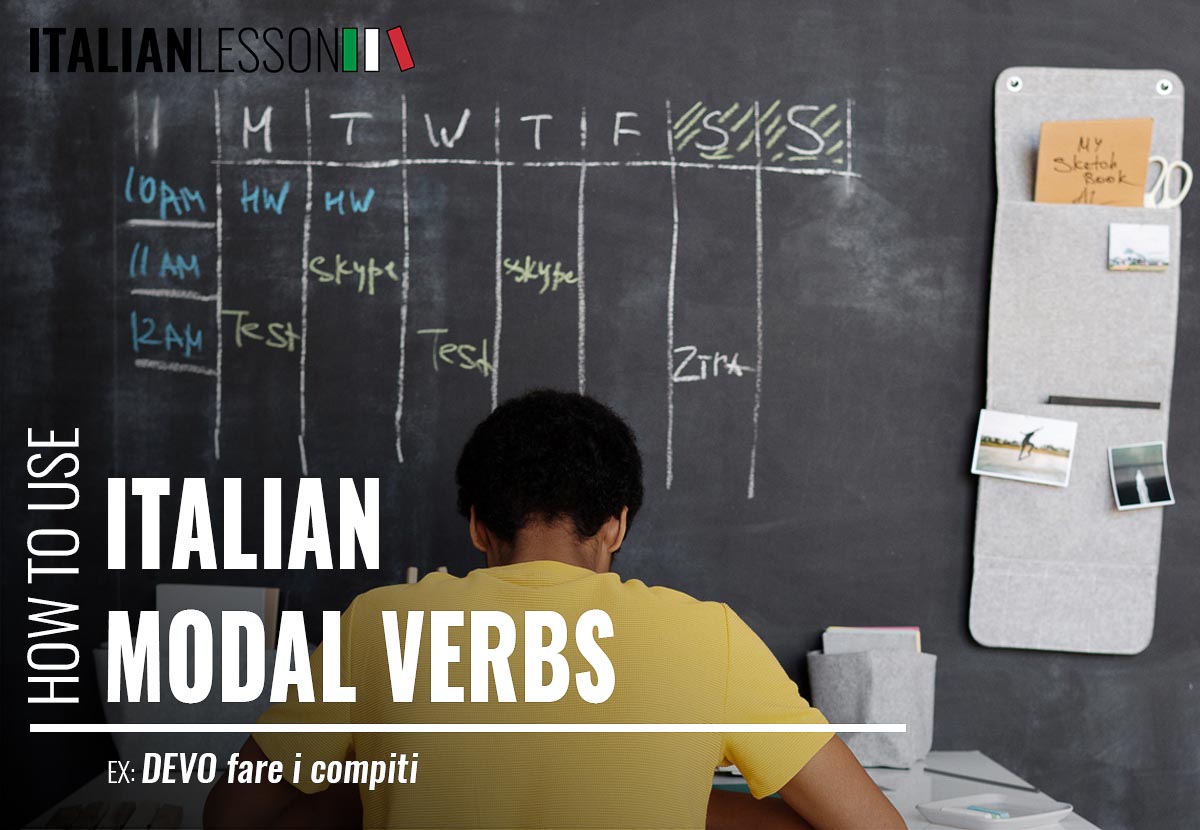
What are the Italian modal verbs?
Before starting this new Italian grammar lesson, are you ready to learn new verbs to insert in your Italian vocabulary? Of course, you will also need to practice your Italian pronunciation with the Italian modal verbs: DOVERE, POTERE and VOLERE!
Italian modal verbs
First of all, an Italian verb can be defined as “modal” or “servile” when it has the function of specifying the relationship between the subject and the verb that follows it.
Italian modal verbs are:
DOVERE – POTERE – VOLERE
Before moving on to the examples of the Italian modal verbs with the English ones, let’s see the conjugations.
| Italian DOVERE conjugation | |
| Io devo Tu devi Egli / Ella – Lui / Lei deve Noi dobbiamo Voi dovete Essi / Esse – Loro devono | I must You must He / She / It must We must You must They must |
The verb DOVERE indicates the obligation or need to do something
Devo fare i compiti / I have to do my homework.
As you can see from the example, the (Devo fare i compiti / I have to do my homework and MUST is mostly used in written rules and instructions
La lettera deve essere inviato non oltre le 18 / The letter must be sent no later than 6pm
DOVERE can be rendered in English with the verbs SHALL and SHOULD
Devo aprire la porta? / Shall I open the door?
Non dovresti accettare / You shouldn’t accept
Go on!
| Italian POTERE conjugation | |
| Io posso Tu puoi Egli / Ella – Lui / Lei può Noi possiamo Voi potete Essi / Esse – Loro possono | I can You can He / She / It can We can You can They can |
The verb POTERE indicates the ability, the possibility or the permission to do something
Io posso suonare la chitarra / I can play the guitar
Possiamo andare in barca? / Can we go by boat?
Può aprire la finestra? / Can you open the window?
In English the Italian verb POTERE can also be expressed with the verbs COULD (the past tense of CAN), MAY and MIGHT.
COULD expresses the same actions as can but is mostly used to indicate actions bordering on reality.
In this case, the modal verb POTERE in Italian is conjugated in the conditional tense:
Potremmo andare al mare / We could go to the sea.
In Italian MIGHT is with the conditional, for example in hypothetical periods:
Se fossi in te, mi cercherei un’altra casa / If I were you, I might look for another home
MAY, like CAN, is used to make requests, but in a formal way:
Mi scusi, potrei avere dell’altro vino? / Excuse me, may I have some more wine?
And now let’s move on to the last Italian modal verb!
| Italian VOLERE conjugation | |
| Io voglio Tu vuoi Egli / Ella – Lui / Lei vuole Noi vogliamo Voi volete Essi / Esse – Loro vogliono | I want You want He / She / It want We want You want They want |
Generally, the English equivalent of the verb VOLERE is TO WANT but in the case of modal verbs, in English WILL e WOULD are used instead.
Ho lasciato il garage aperto. Vado a chiuderlo / I left the garage open. I will close it
Vorrei tanto mangiare un panino / I would love to eat a sandwich.
Plus, in Italian the verb VOLERE indicates a will and the desire to do something:
Voglio mangiare un gelato / I want to eat ice cream
Well, after these clarifications on the correspondences of modal verbs in Italian and English (which is important in order to better understand the grammatical rule), let’s move on to another verb that in Italian can be defined as modal: SAPERE.
In Italian the verb SAPERE (to know) is defined as modal when it expresses the ability to know how to do something:
So fare la crostata / I know how to make a tart / I can cook a tart.
Last conjugation for today:
| Italian SAPERE conjugation | |
| Io so Tu sai Egli / Ella – Lui / Lei sa Noi sappiamo Voi sapete Essi / Esse – Loro sanno | I know You know He / She / It knows We know You know They know |
Do not forget to study all the conjugations! Today’s lesson has been very rich in content so… happy studying!
In this lesson we also talked about conditional tenses, here is the link to the article:
https://italianlesson.it/how-to/italian-verbs/italian-conditional-tense/
Here is a link to learn more:
https://it.wikipedia.org/wiki/Verbo_servile
See you soon
